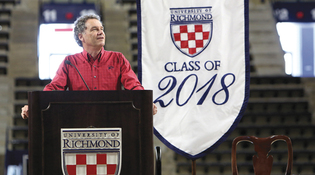 loading
loading
Where They Are NowHistory for everyoneEdward Ayers ’80PhD is making history popular, on campus and on the radio.  Kim Lee Schmidt/Courtesy University of RichmondUniversity of Richmond president Edward Ayers ’80PhD welcomed new freshmen last fall. He will step down as president this spring. View full imageEdward Ayers ’80PhD, president of the University of Richmond since 2007, is a historian who specializes in the nineteenth-century American South. He is one of the hosts of the public radio program BackStory. In 2013, President Obama awarded him the National Humanities Medal. Y: You’re stepping down this year after eight years as president of Richmond. I’m hearing a lot more admissions buzz about your school these days. How do you account for that? A: It’s just coming into its own. It received a $50 million gift in 1969, and over the next decade it went from 85 percent in-state students to 85 percent out-of-state, and it went need-blind. It’s thrilling to be part of a “new” school that’s an engine of democracy and equality in the South. We’ve gone from 11 percent students of color in 2007 to 28 percent in 2014, and we’ve doubled our Pell Grant numbers. Y: You grew up in Tennessee and went to college there. I couldn’t wait to get rid of my Oklahoma accent when I came to Yale. How is it that you kept your accent? A: My accent is kind of an advantage: if you talk like this and can put together a paragraph, you get extra points. But I didn’t make any special effort to keep it. My wife and I were married at 21, and we’d never been anywhere, really. At Yale, we discovered that we had an ethnicity, which made us interesting people there. Y: Who did you study with at Yale? A: I studied with C. Vann Woodward and David Brion Davis and discovered Southern history, a great tradition of which I was not aware. Woodward was so powerful and charming, and his Origins of the New South changed my life. I was in American studies and interested in literature, but when I read it, I thought, “If this is what history is, I want to write history.” Y: One of your local initiatives in Richmond was to try to create a more honest dialogue about the Civil War during its sesquicentennial. How has that worked out? A: We created an alliance called the Future of Richmond’s Past, bringing together the historical stakeholders in the area—everyone from the Museum of the Confederacy to the Black History Museum. The idea was that it would be better if, instead of just the Civil War, there was a sesquicentennial of the Civil War and emancipation. This year, we’re celebrating the end of American slavery where Abraham Lincoln did: he came to Richmond and was surrounded by freed people as they were putting out the fires from the burning of the city. Y: Do you get pushback from Southern traditionalists about this new approach? A: Part of my job—and one good use of this accent—is to tell the story whole and to be compassionate to everyone, to ask, “What were they thinking?” about all the people involved in the war. And I think Richmond has done as good a job as anywhere in the country. Y: You’ve urged Southerners to confront their own history more realistically. What perceptions of the South do outsiders have that need to be reexamined? A: The poor white South is the last part of the country you can make jokes about, and really it’s a way to laugh at poverty, which I think is unfair. If people would think of regional language and humor the way they think of other kinds of humor, we’d be better off. It’s heartening, though, to see schools like Yale beginning to recognize the rest of the nation’s complicity in slavery. There’s enough wrong to go around, and the solution to the ongoing legacy of slavery and segregation is not just local but national.
The comment period has expired.
|
|